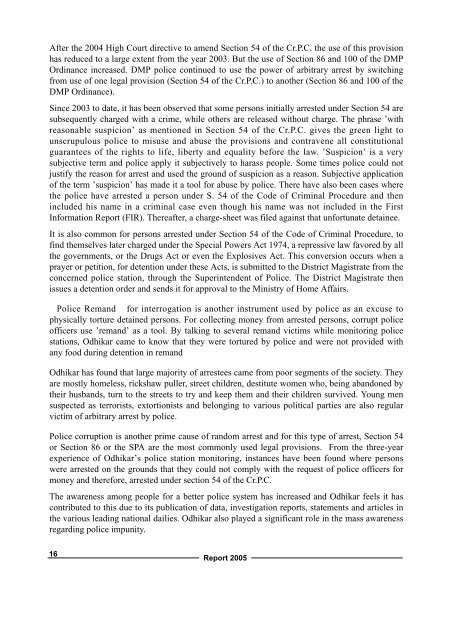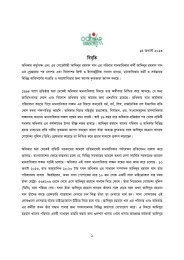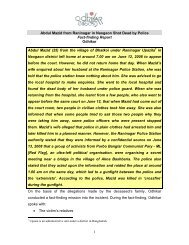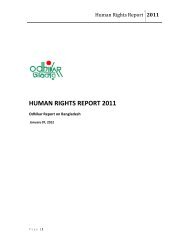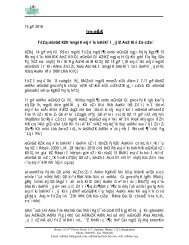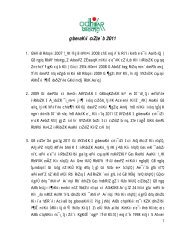Please - Odhikar
Please - Odhikar
Please - Odhikar
Create successful ePaper yourself
Turn your PDF publications into a flip-book with our unique Google optimized e-Paper software.
After the 2004 High Court directive to amend Section 54 of the Cr.P.C. the use of this provision<br />
has reduced to a large extent from the year 2003. But the use of Section 86 and 100 of the DMP<br />
Ordinance increased. DMP police continued to use the power of arbitrary arrest by switching<br />
from use of one legal provision (Section 54 of the Cr.P.C.) to another (Section 86 and 100 of the<br />
DMP Ordinance).<br />
Since 2003 to date, it has been observed that some persons initially arrested under Section 54 are<br />
subsequently charged with a crime, while others are released without charge. The phrase ’with<br />
reasonable suspicion’ as mentioned in Section 54 of the Cr.P.C. gives the green light to<br />
unscrupulous police to misuse and abuse the provisions and contravene all constitutional<br />
guarantees of the rights to life, liberty and equality before the law. ’Suspicion’ is a very<br />
subjective term and police apply it subjectively to harass people. Some times police could not<br />
justify the reason for arrest and used the ground of suspicion as a reason. Subjective application<br />
of the term ’suspicion’ has made it a tool for abuse by police. There have also been cases where<br />
the police have arrested a person under S. 54 of the Code of Criminal Procedure and then<br />
included his name in a criminal case even though his name was not included in the First<br />
Information Report (FIR). Thereafter, a charge-sheet was filed against that unfortunate detainee.<br />
It is also common for persons arrested under Section 54 of the Code of Criminal Procedure, to<br />
find themselves later charged under the Special Powers Act 1974, a repressive law favored by all<br />
the governments, or the Drugs Act or even the Explosives Act. This conversion occurs when a<br />
prayer or petition, for detention under these Acts, is submitted to the District Magistrate from the<br />
concerned police station, through the Superintendent of Police. The District Magistrate then<br />
issues a detention order and sends it for approval to the Ministry of Home Affairs.<br />
Police Remand for interrogation is another instrument used by police as an excuse to<br />
physically torture detained persons. For collecting money from arrested persons, corrupt police<br />
officers use ’remand’ as a tool. By talking to several remand victims while monitoring police<br />
stations, <strong>Odhikar</strong> came to know that they were tortured by police and were not provided with<br />
any food during detention in remand<br />
<strong>Odhikar</strong> has found that large majority of arrestees came from poor segments of the society. They<br />
are mostly homeless, rickshaw puller, street children, destitute women who, being abandoned by<br />
their husbands, turn to the streets to try and keep them and their children survived. Young men<br />
suspected as terrorists, extortionists and belonging to various political parties are also regular<br />
victim of arbitrary arrest by police.<br />
Police corruption is another prime cause of random arrest and for this type of arrest, Section 54<br />
or Section 86 or the SPA are the most commonly used legal provisions. From the three-year<br />
experience of <strong>Odhikar</strong>’s police station monitoring, instances have been found where persons<br />
were arrested on the grounds that they could not comply with the request of police officers for<br />
money and therefore, arrested under section 54 of the Cr.P.C.<br />
The awareness among people for a better police system has increased and <strong>Odhikar</strong> feels it has<br />
contributed to this due to its publication of data, investigation reports, statements and articles in<br />
the various leading national dailies. <strong>Odhikar</strong> also played a significant role in the mass awareness<br />
regarding police impunity.<br />
16<br />
Report 2005


